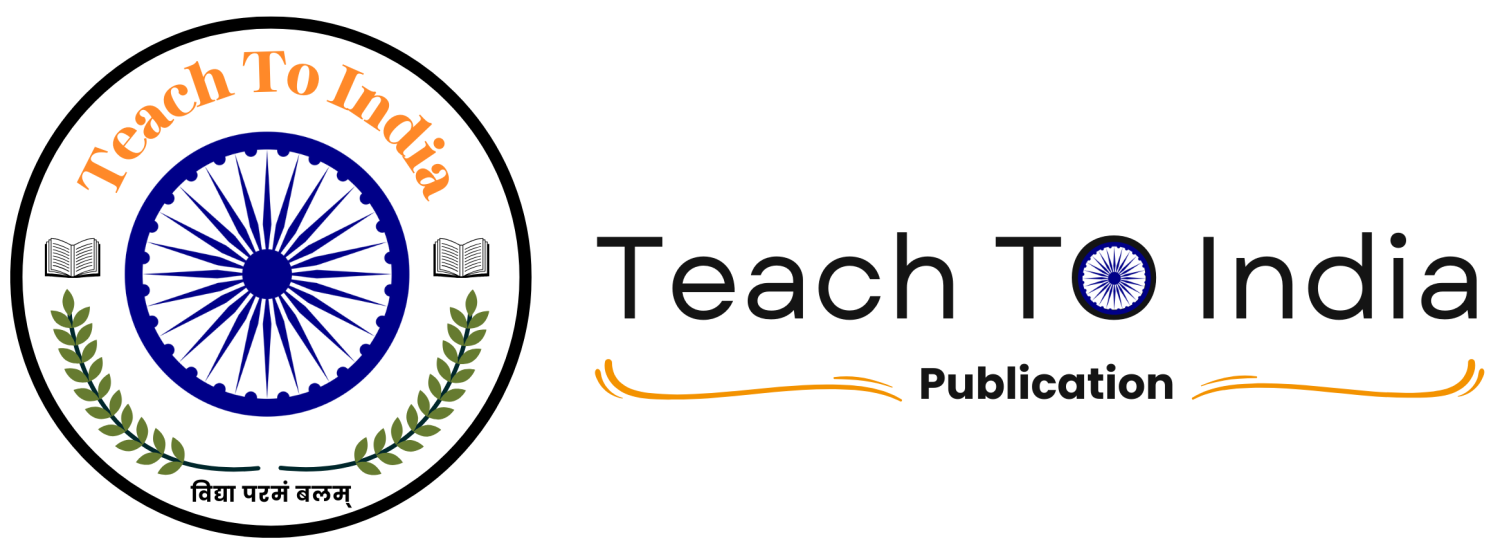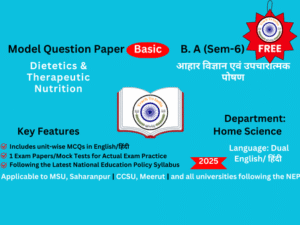परिधानों का अलंकरण (सेमेस्टर -5)
- Description
- Curriculum
- Reviews

Teach To India प्रकाशन
परिधानों का अलंकरण
-
यह मॉडल पेपर यह सुनिश्चित करता है कि सभी संभावित प्रश्न जो परीक्षा में आ सकते हैं, वे यूनिट में पूरी तरह से शामिल हैं, चाहे वे सीधे हों या अप्रत्यक्ष रूप से।
-
इसे अनुभवी प्रोफेसरों द्वारा बहुत सावधानी से तैयार किया गया है, जिन्हें परीक्षा मॉडल पेपर बनाने का व्यापक अनुभव है।
-
इस पेपर में विश्वविद्यालय द्वारा निर्धारित पाठ्यक्रम के आधार पर सभी मुख्य प्रश्न शामिल हैं।
-
400 से अधिक प्रश्न और उत्तरों के साथ, यह मॉडल पेपर विषय का पूरा पाठ्यक्रम कवर करता है।
-
प्रत्येक यूनिट में दीर्घ उत्तरीय ,लघु उत्तरीय और अति लघु उत्तरीय वाले प्रश्न शामिल हैं ताकि छात्रों को गहन समझ प्राप्त हो सके।
-
हमारे प्रश्न इस तरह तैयार किए गए हैं कि प्रत्येक यूनिट को कम से कम और अच्छी तरह चुने हुए प्रश्नों से कवर किया जा सके।
-
अनिवार्य आंतरिक परीक्षा के लिए हम 200 एक पंक्ति के प्रश्न-उत्तर प्रदान कर रहे हैं, जो प्रत्येक यूनिट को समान रूप से कवर करते हैं।
-
इस मॉडल पेपर में मॉक प्रश्नपत्र / पिछले साल के प्रश्नपत्र भी हल के साथ दिए गए हैं, जिससे छात्रों को परीक्षा के प्रश्नों की गहराई और विस्तार को समझने में मदद मिलती है।
Programme /Class: Degree
Year: Third
Semester: Fifth
Major Course
Course Title: Surface Ornamentation Of Fabrics
Course outcomes:
• Knowing why fabrics look differently
• Identify the different techniques of fabric from surface
• Learn about finishes done on fabrics
• Knowing about dyeing fabrics
• Learn how printing on fabrics is carried
• Knowing the traditional embroideries of India
• Identifying traditional textiles of different states
• Knowing the importance of appropriate laundry method
Credits: 4
Core Compulsory / Elective
Max. Marks: 25+75
Min. Passing Marks: 8+25
Unit
Topics
I
Techniques of Creating variety on fabrics
(a) weaving
(b) finishing of fabrics
(c) dyeing of fabrics
(d) printing fabrics
(a) embroidery and other decoration methods
II
Finishes
(a) Classification of fabric finishes
(b) Study of purpose and process of finishes
(i) General Purpose finishes-Bleaching, Mercerization, Calandering, Sanforization, Tentering, Singeing, Scouring
(ii) Functional Finishes
III
Dyeing –Classification and use of dyes-Natural v/s Synthetic, (Basic, Acidic, Direct, Azoic, Natural, Sulphur, Vat, Disperse and Reactive dyes) Resist Dying Techniques- Tie & Dye, Batik.
IV
Printing
(a) Direct printing- Block, Screen, Stencil, Roller
(b) Transfer printing
(c) Discharge printing, Resist printing
(d) Polychromatic, Inkjet and Digital printing techniques
(e) After treatment of dyed and printed goods
V
Traditional Embroideries: Meaning and status of traditional craf India, Knowing about the Traditional Embroideries of different s Zardozi, Kashida of Kashmir, Phulkari of Punjab, Kantha of Ben Chikankari, Kasuti, of UP, Sindh and Kutch work of Gujarat.
VI
Traditional Textiles: Knowing the Traditional textiles of different states of India (a) Woven fabrics- Baluchars, brocades, Kashmir carpets, Patola, Ikat, Pochampalli, Chanderi.
(b) Printed, painted and dyed-Sanganeri, Bhagru, Kalamkari, Madhubani, Bandhani.
VII
Water:
(a) Water and its uses in textile industry, properties,
(b)types of water used for processing
(c) Hardness and removal of Hardness of water.
VIII
Laundry and dry cleaning of fabrics and garments
(a) Methods of Laundry and Dry cleaning
(b) Dry cleaning process
(c) Reagents of Laundry-Blues, Bleaches, Optical Brighteners, Stiffening agents (d) Types of soaps and detergents
(e) Cleaning action of soaps and detergents.







